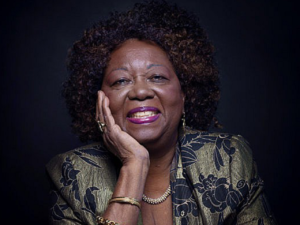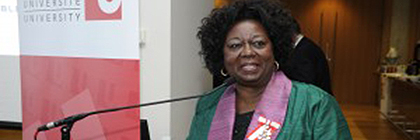
When former MP Jean Augustine (LLD ’11) was elected to the Parliament of Canada in 1993, she brought with her the hopes of her community, the voices of those she advocated for and the aspirations of her ancestors. As the first Black woman elected as a Member of Parliament, she was automatically catapulted to the status of role model for the millions who would come after her.
Now in her 80s, Augustine continues to advocate for the causes that are important to her, including the initiative to fully endow the Jean Augustine Chair in Education, Community and Diaspora at York University.
That’s why, when Augustine contacted Sheldon Pitt – better known as Solitair, a recognized music producer and community activist – in June 2020, to ask him to revive the campaign to fully endow the Chair, he knew to take her request seriously. Having grown up referring to her as his “Auntie Jean,” Solitair had seen her advocacy and determination firsthand and had heard her stories about the challenges and successes she had experienced as he grew up.
“My parents grew up with ‘Auntie Jean’ in Grenada, so I had spent many holidays as a child listening to them reminisce and share stories over meals,” said Solitair. “One thing that always resonated for me was the idea that having a voice on the important issues really matters. So when my ‘Auntie Jean’ explained the significance of the chair, I knew it was an opportunity for me to help ensure that the voice she, and as so many others, had given to issues like diversity and education could continue indefinitely.”
To assemble his team, Solitair wanted people who he knew would be just as passionate about continuing Augustine’s legacy as he was, so he recruited long-time friends, Jennifer Seif and Willona Fraser, both York alumni, to form the Jean Augustine Chair Endowment Fund (JACEF) Committee. In October 2020, the team of volunteers launched a social media campaign called “Bridge for Change” to help build awareness, educate the public and start a discussion about the work of the Chair.
Augustine envisions a Chair that is “for the people, by the people”, so the JACEF Committee launched the campaign into high gear with the “25K in 25 Days” initiative, which aims to highlight the 25th anniversary of Black History Month in Canada by raising $25,000 towards the endowment fund in 25 days from community sources during the month of February. To strengthen that goal, corporate sponsor Accenture will match all community donations to the fund throughout the month.
One of only two endowed university Chairs in Canada dedicated to research and knowledge mobilization endeavours on Black and African-descended communities, the Jean Augustine chair seeks to:
- Foster an understanding of the diverse cultural and educational needs of students;
- Facilitate leadership on matters of access, equity, inclusivity and social justice;
- Strengthen university-community partnerships and engagement; and,
- Build educational and social capacity among students, junior scholars and community members.
Recent world events have brought to the forefront the need for leaders, communities, businesses and individuals to take action to combat systemic racism and advocate for social justice issues globally. Canada is not immune to the reality of racism and how it can marginalize and disenfranchise those most vulnerable. Education is one of the keys to driving long-lasting, fundamental change in Black and other racialized communities across Canada.
“Continuing Jean’s legacy is much bigger than the committee or York University,” said Solitair. “It falls to all those she has motivated to claim their seat at the table with her boldness, her strength and her ability to think beyond the bounds of what is expected to what is possible.”
Learn more about the Jean Augustine Chair in Education, Community and Diaspora and how you can contribute here. To read more about Jean Augustine’s life and work, visit her website.





























